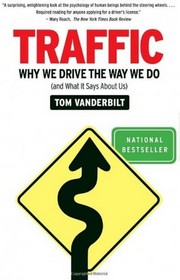Helpful Score: 8
Traffic is both vindicating and disheartening for people such as myself who fancy themselves excellent drivers. I found myself frequently quoting passages from Vanderbilt's lengthy tome to prove to my spouse that, as I had previously observed but had no empirical evidence to support, other people's poor driving habits endanger me and anyone else forced to share the roads with those idiots. However, as I read on I would inevitably get silent as he described other dangerous driving habits that I have (on rare occasions, of course) been guilty of.
Although road engineering and safety features in automobiles are discussed, Vanderbilt makes a convincing case that ultimately human behavior determines accident rates. Anytime engineers find a way to make driving safer or traffic flow more smoothly people will inevitably find a way to crash or cause congestion.
This book is a meticulously researched wake up call that every driver should read. Unfortunately, despite the fact that this book is creeping up the Times best seller list, many people will not. Although written in clear prose and filled with amusing person anecdotes, this book does require some concentration and dedication to get through. It is well researched (as the lengthy notes section at the end demonstrates), and consequently is quite long and contains a lot of numbers and statistics. It is doubtful that a person who cannot concentrate on the driving task will be able to make it through this book. Interested parties will be rewarded however... or at least will have some interesting things to discuss on their cell phones while driving to work.
Although road engineering and safety features in automobiles are discussed, Vanderbilt makes a convincing case that ultimately human behavior determines accident rates. Anytime engineers find a way to make driving safer or traffic flow more smoothly people will inevitably find a way to crash or cause congestion.
This book is a meticulously researched wake up call that every driver should read. Unfortunately, despite the fact that this book is creeping up the Times best seller list, many people will not. Although written in clear prose and filled with amusing person anecdotes, this book does require some concentration and dedication to get through. It is well researched (as the lengthy notes section at the end demonstrates), and consequently is quite long and contains a lot of numbers and statistics. It is doubtful that a person who cannot concentrate on the driving task will be able to make it through this book. Interested parties will be rewarded however... or at least will have some interesting things to discuss on their cell phones while driving to work.
Julie B. reviewed Traffic: Why We Drive the Way We Do (and What It Says About Us) on + 65 more book reviews
Helpful Score: 5
Much of what we believe about traffic is wrong. The author effectively drives that point home at many times throughout this book. He converted me on two issues: roundabouts and cell phone usage while driving. I still hate driving through roundabouts, but I regret my neighborhood's pressure to put in a stop light instead of a roundabout ate an intersection by a school in our neighborhood. Looking back, I was wrong in my belief the traffic light would provide more safety for the hordes of children walking to school through the intersection every day.
I've also given up cell phones while I drive. I did believe I was compensating while talking, but I was, in fact, doing exactly what the author said cell phone users do: drive like a teenager by fixating on the road in front of me. I wonder though, how they differ from having a conversation with a passenger.
I do think he got one issue backwards. He briefly mentioned red light cameras as improving safety, but I've read they typically increase the accident rates at intersections because they increase rear end collisions caused by people slamming on their brakes to avoid a ticket.
I've also given up cell phones while I drive. I did believe I was compensating while talking, but I was, in fact, doing exactly what the author said cell phone users do: drive like a teenager by fixating on the road in front of me. I wonder though, how they differ from having a conversation with a passenger.
I do think he got one issue backwards. He briefly mentioned red light cameras as improving safety, but I've read they typically increase the accident rates at intersections because they increase rear end collisions caused by people slamming on their brakes to avoid a ticket.
Helpful Score: 1
Very interesting, though the material did not cover the same info as the author gave in interviews. I have become a later merger.




![header=[] body=[Get a free book credit right now by joining the club and listing 5 books you have and are willing to share with other members!] Help icon](/images/question.gif?v=90afaeb39)
